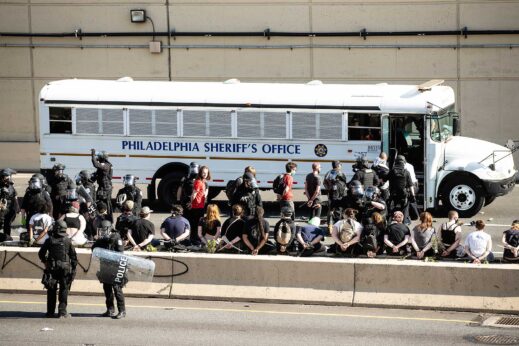
Tirado was one of the hundreds of people who were severely injured during the George Floyd uprisings, and will eventually become one of the dozens of people who were killed during this time. I n the years since, cities across the U.S. have paid out at least $80 million in settlements to protesters.

The fascistic violence of 2020 was a fitting bookend for a presidency that began with mass protests against the inauguration, police brutality unprecedented in modern times, and the white supremacist rallies and murder of Heather Heyer in Charlottesville, Va.
This is not to say that protests of the pre-Trump era were allowed to peacefully assemble; nor has that been true for those of the post-Trump period. For proof of that, we need only look at the recent arrests of student encampment protesters pushing for an end to the genocide in Gaza across the United States or the terror wrought by racists against Palestinians and people of Arab descent lately.
The history of the United States has been written by a plethora of mass movements propelling working-class people into the streets—from May Day to the Civil Rights Movement to anti-war protests opposing one U.S. imperialist misadventure after another. Often, but not always, these mass movements result in progressive action taken at the ballot box.
It was a cynical ploy for Joe Biden’s presidential campaign to claim that the protests in Charlottesville were what inspired him to run, but his campaign knew they were speaking to a tried-and-true electoral tactic by having him do so. The election of his predecessor, Barack Obama, though governing during a period that saw gruesome police violence at Standing Rock and against Black Lives Matter protesters, was itself, at least in part, a response to the eight years of George W. Bush’s “War on Terror,” which also saw unprecedented attack on civil rights across the board at home while waging war abroad.
When the news broke that Biden won the 2020 elections, residents of New York leaned out of their windows to bang pots and pans together in celebration. Was it because they were so confident that the oldest man ever elected president, a man who has held elected office for more than 20% of the history of the United States, would oversee an administration driven by progressive change and renewal? Or was it because they felt the boot lift off their necks?

People’s World interviewed Callum Wilson, Communist Party district committee member for Eastern Pennsylvania and Delaware. His answer to that question echoes many others who sacrificed much to bring Trump down in 2020: “Biden’s victory was, among many things, a referendum on Trump and his crackdown on the movements. Trump lost decisively.”
Wilson is one of the many thousands brutalized by police violence during the 2020 Black Lives Matter uprisings across the country. On June 1, 2020, Wilson and his brother were among the activists who shut down I-676 in Philadelphia to demand justice for George Floyd and Breonna Taylor.
“My brother and I were in the front lines as we entered the overpass,” he recalled. “There, roughly a few hundred feet ahead of us, two black SUVs labeled ‘State Police’ arrived. The crowd stopped; suddenly there was a mad rush.”
His memory of what happened next is still sharp.
Officers, clad in black and wielding rifles, “began to shoot rubber bullets as I heard several cracks of fire before everyone began to run. No warning was given, no resistance offered.” Wilson said everyone “was either running or standing their ground with hands up shouting: ‘Don’t shoot!’”
It was only a few moments later that Wilson discovered he had taken a rubber bullet directly to the chest. Because of the fear and the rush of adrenaline, he did not notice right away.
“By then, officers began to fire tear gas after the crowd as we ran away. Behind me, officers who mounted the divider were spraying mace into the crowd. I was separated from my brother and called out his name as more screams and the cracks of fire erupted around me.”
After several agonizing moments, he finally found his brother and together they made a rush, along with the rest of the crowd, to climb the hill they’d come down on in order to enter the highway.
“As we began to climb, more tear gas was fired on us. I could not breathe. I was choking, and I felt my throat closing. I lost my brother again. However, a man helped me up. I passed a struggling woman and helped her up. The three of us attempted to make it up the hill and over the high fence.”
They failed. The stampede of people had churned the gravel beneath their feet, and the air was now filled with rock dust as well as tear gas, “which again, despite us fleeing for our lives, was still coming.” Wilson ran back down the hill toward the highway. “Believing I was going to die, I ran for my life, away from the fence and back down the street.”
As for Wilson’s brother, he was discovered later that his arm was broken, busted by a steel gas canister that police fired at him. “Every day, I am thankful that it did not hit his head,” Wilson recalled. “I could not bear losing my best friend in life. My brother and I were far from the worst injured, but there are other wounds that do not show on flesh and linger on in the mind.”

Wilson and his brother were two of the more than 300 people who eventually received remuneration from the City of Philadelphia for the injuries caused by police that day. The money wasn’t much, though.
“My settlement barely covered a year of my student loans,” Callum pointed out. “I did a lot of begging to get loan pauses, as I could not defer. The indignity of the city of my birth brutalizing me is hard to stomach even now, because being from Philadelphia fills me with pride. But we had an amazing legal team, and the fact that we won anything at all was something. This is something not everyone was able to enjoy outside of Philadelphia.”
Most of the people who were on the receiving end of police violence during the Trump years have never received any kind of financial compensation for their injuries and the impacts on their lives. Community-organized assistance efforts, like crowdfunding through organizations such as the Democratic Socialists of America and other groups in response to the violence in Charlottesville, for instance, have tried to fill the gaps for some. (Disclosure: The author was a beneficiary of this fund in 2017.)
More action is needed to recognize the veterans of these social movements, starting with universal health care and a social safety net that isn’t shredded by decades of neoliberal austerity. Yet, achieving this will take a long-term strategic outlook on building working-class power, something that many activists worry is missing nowadays.

“I think people tend to have a short memory,” Wilson admitted. “I think many have forgotten that Trump wanted to crack skulls and shoot people down,” he said. “I think many have forgotten the special agents who grabbed people in the night, I think people have forgotten Kyle Rittenhouse and the gangs of fascist thugs who took the law into their own hands to murder, assault, and terrorize freedom-loving Americans exercising their rights, and I think too many have forgotten the ultimate sacrifice that anti-fascists heroes like Heather Heyer made in the fight against reaction.”
Wilson is firm on his perspective. “To forget these things, is, in my view, paramount to treason in the anti-fascist and anti-racist freedom struggle. It dishonors our sacrifices and more importantly, makes us weak against the fascist threat.”
As with all op-eds published by People’s World, this article reflects the views of its author and/or those quoted.










